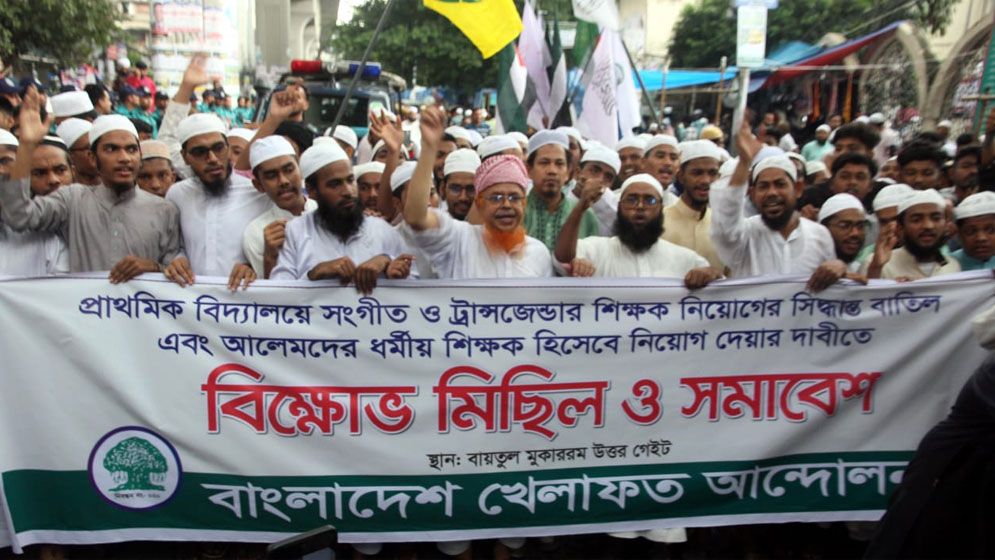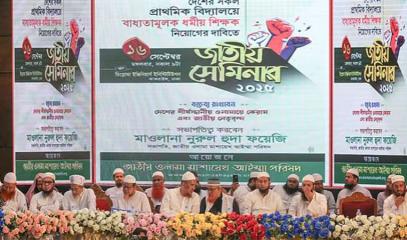Muslim leaders protest teaching music in schools, demand teaching of the Qurʾān
Behind the controversy is a demand from Muslim leaders and movements to revoke the government circular regarding the hiring of music teachers in public primary schools. They call it an "Islamophobic" decision. Civil society groups are up in arms, defending the secular nature of the schools. The clash reflects the deep tensions between those who support Sharia (Islamic law) and those who defend the constitution.
Dhaka (AsiaNews) – In Bangladesh an increasingly bitter controversy over the role of culture and religion in the primary education system is sparking a fiery public debate and fuelling tensions that have also spilled over into the political sphere.
Behind the clash is a demand from some Muslim leaders who want to see a government circular providing for the hiring of music teachers in public primary schools scrapped, insisting that (Islamic) religion teachers be appointed in their place.
The National Ulama MashayekhAimma Parishad, a council of Muslim scholars and religious leaders, made the demand during a national seminar held yesterday at the Institution of Diploma Engineers Bangladesh (IDEB) in Dhaka.
Various Islamic parties and organisations were represented at the event, with members threatening street protests if their demands were not met. In fact, a demonstration was announced for this Friday, at the north gate of the Baitul Mukarram Mosque after the noon Jummah prayers.
Mufti Syed Rezaul Karim, ameer of the Islamic Movement of Bangladesh, criticised the government's move.
“What is the government trying to imply by appointing music teachers?” he asked. “The circular must be cancelled immediately, and religious teachers must be appointed.”
Others have framed the issue as a threat to Islamic identity. Jalaluddin, secretary general of the Khilafat Majlis, denounced a “conspiracy to make the future generation Islamophobic.”
Maulana Nurul Huda Faizi, president of Ulama MashayekhAimma Parishad, added: “We must eradicate negative culture. The shortage of religious teachers in schools must be eliminated.”
The debate intensified following the remarks of Maulana Mujibur Rahman Hamidi, Nayeb Ameer of the Bangladesh Khilafat Movement, who spoke at a rally on 12 September.
“Ninety percent of students in primary schools are from Muslim families,” he said. “They cannot read the Qurʾān or perform prayers correctly. The government must take responsibility for teaching the Qurʾān. The state cannot use public funds to promote dance and singing.”
The Muslim leader also opposed the appointment of transgender teachers, calling it part of an “Islamophobic decision”.
These demands have not gone unchallenged, drawing strong criticism from civil society groups and the country's secular community. Ain o Salish Kendra (ASK), a leading human rights organisation, has condemned these demands as divisive and unconstitutional.
In a statement, Senior Coordinator Abu Ahmed Faizul Kabir said, “This demand is not only misleading but a deliberate attempt to spread division and hatred in society.” He stressed that the Constitution of Bangladesh guarantees every citizen the right to practise his or her culture and participate in art and literature.
“Music and art have been integral to Bangladesh’s history, from the language movement to the Liberation War and democratic struggles,” Kabir explained. “Music education is not just entertainment; it fosters mental development, moral education, creativity, and tolerance.”
The ASK warned that cancelling the appointments of music teachers would weaken national culture and risk damaging the foundations of social unity.
“While the need for religious teachers can be discussed separately, it is unacceptable to use that demand to undermine cultural education,” Kabir’s statement reads. “Such efforts hinder development and threaten the pluralistic spirit of our society”.
In fact, the clash reflects deeper tensions between right-wing religious values and the secular and inclusive principles enshrined in the country’s constitution.
A retired Catholic teacher, who asked his name be withheld, told AsiaNews that the situation for religious minorities has worsened since the fall of Sheikh Hasina's government on 5 August last year. “Islamist groups are now asserting their influence more openly,” he explained.
In their view, “The demand to replace music teachers with religious instructors in primary schools is part of a broader push to reshape the country’s cultural and educational landscape. If this trend continues, it will become increasingly difficult for faith minorities like us to live and practise freely in Bangladesh.”
07/11/2025 14:53
18/06/2010








.png)










